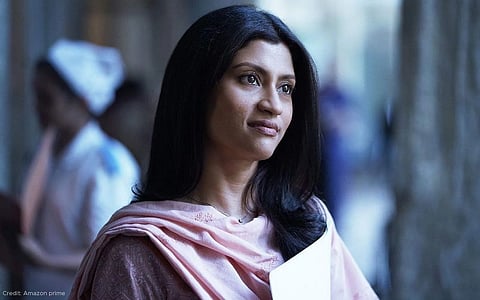
- Reviews
- Power List 2024
- Cannes 2024
- In-Depth Stories
- Web Stories
- News
- FC Lists
- Interviews
- Features
- FC SpecialsFC Specials

Almost two decades into her illustrious career as an actress, Konkona Sen Sharma continues to challenge herself, pushing her boundaries from one medium to another. After venturing into the digital space with well-received performances in Geeli Pucchi (Ajeeb Daastaans) and Alankrita Shrivastava's Dolly Kitty Aur Woh Chamakte Sitare, come September 9, and she will make her web series debut with Amazon Prime Video's upcoming series, Mumbai Diaries 26/11. In a candid chat, she talks about what connected her to her character – a frontline worker – and her process of blending herself (and sometimes her personal life) with the roles she chooses.
Edited excerpts:
Rohini Ramnathan: When Nikkhil Advani brought this series to you, was it the empathy required for this character that appealed to you?
Konkona Sen Sharma: I think so. I've known Nikkhil for a couple of years now, so I knew that he'd do a good job on this. But the most important thing for me was, firstly, it was my first web series. I was given a thick, fat script. It was not like a regular script because it was eight episodes, which is three or four times a movie. But it was so easy to read. Even more than my character (it's an ensemble piece), I just felt that it was such a page-turner at a script-level. Finally, when it is a finished product, with all the elements coming in, it will hopefully be something that people would really want to watch. The material was very engaging for me, and so was my character Chitra Das, a Social Services Director in a government hospital in Mumbai. At one point, I used to do very typical roles of strong women or women of substance with a lot of strength and moral integrity. This character is a bit different. Chitra is full of self-doubt. She doesn't really believe in herself because of her past trauma. Her vulnerability is what made me connect to her a lot.
RR: Nikkhil had said that a film is like a sprint and a series is like a marathon. Perhaps you have to stay in this much longer, in terms of mood, look and feel. Personally, as an actor, what's your process like? Say, when you are shooting for a serious scene, do you find it necessary to be serious at that time, or are you the kind of a person who's back to being themselves as soon as the camera is shut?
KSS: I have to say that one of the most important things for me is a rehearsal. As an actor, I have to rehearse my lines many times because I did not get much exposure to Hindi during my childhood. I was brought up in Kolkata, and I didn't even study Hindi as a second language. Also, my mother (Aparna Sen) did not allow me to watch most of the big, commercial Hindi/Bengali films that came out in the 80s-90s. So for me, rehearsals are very important. Sometimes I get my lines recorded too to get them right.
The other things I have later observed myself doing: One, everything is already in us, all the emotions are inside. But everything doesn't come out all the time. At different phases of our life, different aspects of ourselves come out. And when you are playing a character, you have to maybe bring out some other aspects. Here, reading has really helped me because when you are reading, you are mentally putting yourselves in the shoes of another character and seeing it from another perspective.
The other thing is, sometimes, I try to find a real person in my periphery who I can vaguely base my characters on, to give them some concrete shape. Sometimes, I tend to tweak my own life to be in sync with my character, which is a very dangerous thing. For example, if I have to be very upset for a scene that I know I am shooting that day, or an upcoming scene, then sometimes I will. If something little has happened, and I wasn't really upset before and had dealt and managed with it, I will let it affect me. I will let it upset me a little extra because I know that it would be useful later on during the shoot.